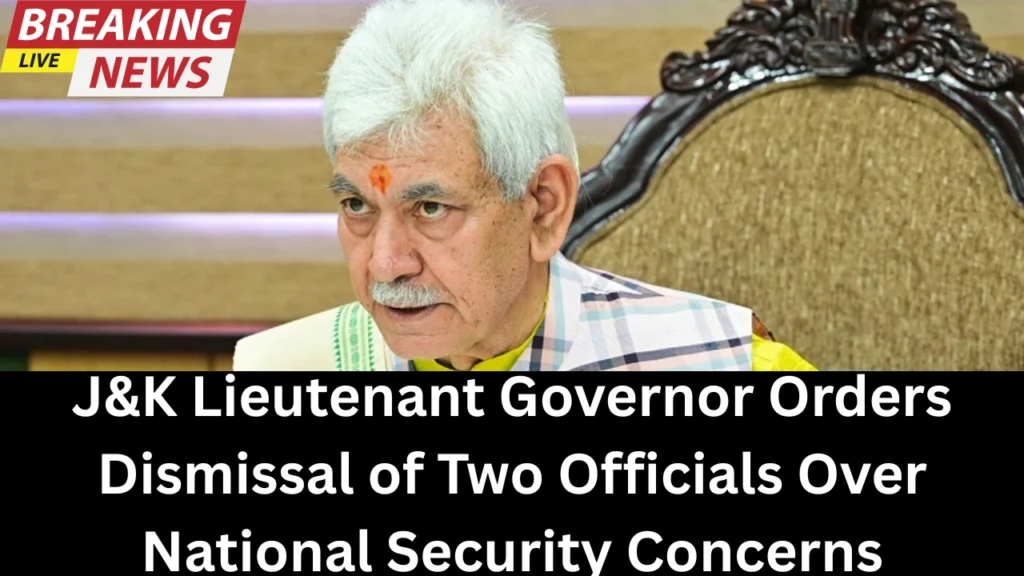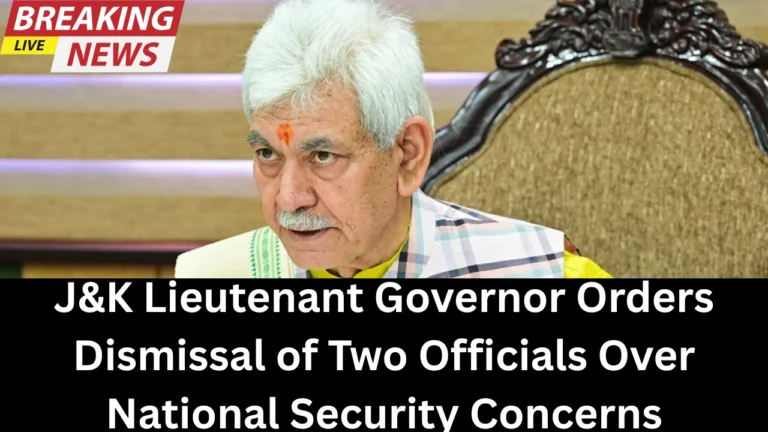In a decisive move reflecting the Jammu and Kashmir administration’s tough stance on internal security, Lieutenant Governor Manoj Sinha on Thursday dismissed two government employees from service over their alleged involvement in anti-national and terror-linked activities. The action was taken under Article 311 of the Constitution of India, which permits termination without a departmental inquiry when deemed necessary for the security of the state.

J&K LG dismisses 2 govt employees—Basharat Ahmad Mir (JKP) & Ishtiyak Ahmad Malik (PWD)—under Article 311 for alleged #AntiNational links. One accused of spying for #Pakistan, other linked to #HizbulMujahideen & Jamaat-e-Islami. #JammuAndKashmir #UAPA #NationalSecurity pic.twitter.com/x2OCqlopGA
— EraofKashmir (@Eraofkashmir1) April 10, 2025
The dismissed officials include:
- Basharat Ahmad Mir, Assistant Wireless Operator, Police Department, resident of Upper Brein, Srinagar
- Ishtiyak Ahmed Malik, Senior Assistant, Public Works Department (PWD), resident of Shitroo Larnoo, Anantnag
With these terminations, the total number of government employees sacked for anti-national activities since the revocation of Article 370 in August 2019 has reached nearly 80.
National Security First: Action Under Article 311
The constitutional provision Article 311(2)(c) gives the government authority to dismiss public servants without a formal inquiry in situations where such a process is not in the interest of state security. This rare and serious measure is typically employed in matters involving:
- Terrorism
- Espionage
- Links with proscribed or hostile organizations
- Involvement in narco-terrorism or anti-India propaganda
The government cited credible intelligence inputs and security assessments for the dismissals, underscoring the policy of zero tolerance against internal subversion and terror facilitation within the state machinery.
Employee Profiles and Allegations
1. Basharat Ahmad Mir – Police Department
According to official sources, Mir was under close surveillance by intelligence agencies for several months. He was allegedly:
- In frequent contact with Pakistan Intelligence Operatives (PIOs)
- Found to be transmitting sensitive information related to security installations, deployments, and patrol schedules
- Aiding external hostile agencies by leaking strategic information
Such acts, if left unchecked, could compromise counter-insurgency operations, putting both civilian and security forces at risk.
2. Ishtiyak Ahmed Malik – PWD
Malik has been identified as a member of the banned Jamaat-e-Islami Jammu & Kashmir (JeI-JK) and an associate of the terror group Hizbul Mujahideen—both designated as terrorist organizations by the Government of India.
He is alleged to have:
- Provided logistical support to militants, including food, shelter, and transport
- Shared intelligence regarding the movement and operations of security forces
- Aided in militant escapes and planned counterattacks
- Indirectly contributed to loss of life among security personnel
Officials said his involvement extended beyond ideological sympathy and entered the realm of active operational support to terror networks.
Broader Crackdown Since Article 370 Revocation
The government’s action is part of a larger administrative and security purge initiated post the abrogation of Article 370, which had granted special status to Jammu and Kashmir. The administration under LG Manoj Sinha has been weeding out elements embedded in government service who allegedly support separatism or terrorism.
Since 2019, authorities have:
- Sacked nearly 80 employees from various departments
- Identified networks operating under the guise of educational, welfare, and religious institutions
- Intensified scrutiny of civil servants with links to banned outfits or cross-border operatives
The strategy reflects an attempt to ensure that the state machinery is free from infiltration by individuals who may misuse their position to harm national interests.
Role of Intelligence Agencies
The dismissals were carried out following a detailed dossier prepared by law enforcement and intelligence agencies, including:
- Technical surveillance
- Human intelligence (HUMINT)
- Banking and communication records
- Cross-referencing with terror activity databases
Officials emphasized that the evidence presented was comprehensive and compelling, leaving no room for ambiguity about the individuals’ roles in activities prejudicial to the security and sovereignty of India.
Legal & Constitutional Implications
While Article 311(2)(c) empowers the government to bypass inquiry procedures, it still ensures that actions are:
- Based on credible intelligence
- Sanctioned by the highest levels of executive authority
- Subject to judicial review, though not required to disclose sensitive evidence in public interest
This balance ensures that national security is not compromised while still adhering to constitutional safeguards.
Official Reactions
Though the government has refrained from publicizing detailed intelligence findings, a senior official from the Home Department stated:
“The involvement of these individuals in anti-national activities posed a grave threat to public safety and the operational efficiency of security forces. The decision to terminate their service was both urgent and necessary.”
Security analysts have welcomed the move, calling it a critical step toward institutional sanitization.
What This Means for the Region
The continued crackdown on insider threats is seen as a key component of the government’s strategy to stabilize Jammu & Kashmir post-2019. Removing compromised individuals from sensitive roles not only disrupts terrorist infrastructure but also sends a strong deterrent signal.
In recent months, the administration has also:
- Strengthened border surveillance
- Enhanced vetting of government recruits
- Monitored online propaganda and digital radicalization
Together, these measures are aimed at denying terrorism the administrative space it once allegedly exploited.
Conclusion: A Message of Zero Tolerance
The dismissal of Basharat Ahmad Mir and Ishtiyak Ahmed Malik underscores the Jammu & Kashmir administration’s unwavering commitment to national security and institutional integrity.
By invoking Article 311, Lieutenant Governor Manoj Sinha has made it clear: there is no room in government service for individuals who compromise the nation’s interests.
As the Union Territory continues on its path of governance, investment, and peace-building, the removal of internal saboteurs remains a vital pillar in ensuring a secure and progressive Jammu & Kashmir.

